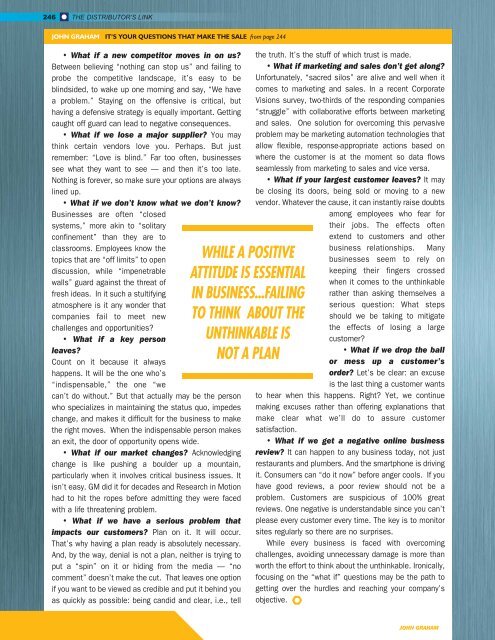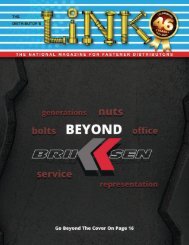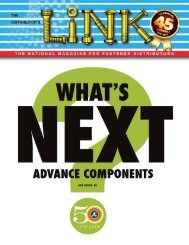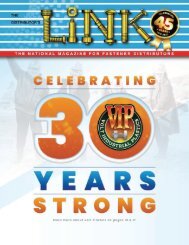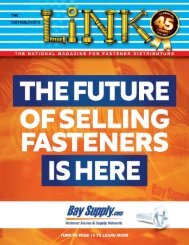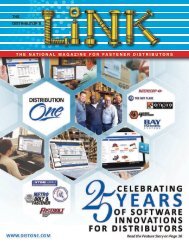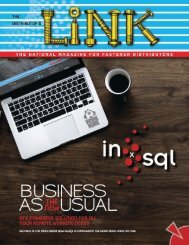FALL 2015
Distributor's Link Magazine Fall Issue 2015 / Vol 38 No4
Distributor's Link Magazine Fall Issue 2015 / Vol 38 No4
Create successful ePaper yourself
Turn your PDF publications into a flip-book with our unique Google optimized e-Paper software.
246 THE DISTRIBUTOR’S LINK<br />
JOHN GRAHAM IT’S YOUR QUESTIONS THAT MAKE THE SALE from page 244<br />
• What if a new competitor moves in on us?<br />
Between believing “nothing can stop us” and failing to<br />
probe the competitive landscape, it’s easy to be<br />
blindsided, to wake up one morning and say, “We have<br />
a problem.” Staying on the offensive is critical, but<br />
having a defensive strategy is equally important. Getting<br />
caught off guard can lead to negative consequences.<br />
• What if we lose a major supplier? You may<br />
think certain vendors love you. Perhaps. But just<br />
remember: “Love is blind.” Far too often, businesses<br />
see what they want to see –– and then it’s too late.<br />
Nothing is forever, so make sure your options are always<br />
lined up.<br />
• What if we don’t know what we don’t know?<br />
Businesses are often “closed<br />
systems,” more akin to “solitary<br />
confinement” than they are to<br />
classrooms. Employees know the<br />
topics that are “off limits” to open<br />
discussion, while “impenetrable<br />
walls” guard against the threat of<br />
fresh ideas. In it such a stultifying<br />
atmosphere is it any wonder that<br />
companies fail to meet new<br />
challenges and opportunities?<br />
• What if a key person<br />
leaves?<br />
Count on it because it always<br />
happens. It will be the one who’s<br />
“indispensable,” the one “we<br />
can’t do without.” But that actually may be the person<br />
who specializes in maintaining the status quo, impedes<br />
change, and makes it difficult for the business to make<br />
the right moves. When the indispensable person makes<br />
an exit, the door of opportunity opens wide.<br />
• What if our market changes? Acknowledging<br />
change is like pushing a boulder up a mountain,<br />
particularly when it involves critical business issues. It<br />
isn’t easy. GM did it for decades and Research in Motion<br />
had to hit the ropes before admitting they were faced<br />
with a life threatening problem.<br />
• What if we have a serious problem that<br />
impacts our customers? Plan on it. It will occur.<br />
That’s why having a plan ready is absolutely necessary.<br />
And, by the way, denial is not a plan, neither is trying to<br />
put a “spin” on it or hiding from the media –– “no<br />
comment” doesn’t make the cut. That leaves one option<br />
if you want to be viewed as credible and put it behind you<br />
as quickly as possible: being candid and clear, i.e., tell<br />
WHILE A POSITIVE<br />
ATTITUDE IS ESSENTIAL<br />
IN BUSINESS...FAILING<br />
TO THINK ABOUT THE<br />
UNTHINKABLE IS<br />
NOT A PLAN<br />
the truth. It’s the stuff of which trust is made.<br />
• What if marketing and sales don’t get along?<br />
Unfortunately, “sacred silos” are alive and well when it<br />
comes to marketing and sales. In a recent Corporate<br />
Visions survey, two-thirds of the responding companies<br />
“struggle” with collaborative efforts between marketing<br />
and sales. One solution for overcoming this pervasive<br />
problem may be marketing automation technologies that<br />
allow flexible, response-appropriate actions based on<br />
where the customer is at the moment so data flows<br />
seamlessly from marketing to sales and vice versa.<br />
• What if your largest customer leaves? It may<br />
be closing its doors, being sold or moving to a new<br />
vendor. Whatever the cause, it can instantly raise doubts<br />
among employees who fear for<br />
their jobs. The effects often<br />
extend to customers and other<br />
business relationships. Many<br />
businesses seem to rely on<br />
keeping their fingers crossed<br />
when it comes to the unthinkable<br />
rather than asking themselves a<br />
serious question: What steps<br />
should we be taking to mitigate<br />
the effects of losing a large<br />
customer?<br />
• What if we drop the ball<br />
or mess up a customer’s<br />
order? Let’s be clear: an excuse<br />
is the last thing a customer wants<br />
to hear when this happens. Right? Yet, we continue<br />
making excuses rather than offering explanations that<br />
make clear what we’ll do to assure customer<br />
satisfaction.<br />
• What if we get a negative online business<br />
review? It can happen to any business today, not just<br />
restaurants and plumbers. And the smartphone is driving<br />
it. Consumers can “do it now” before anger cools. If you<br />
have good reviews, a poor review should not be a<br />
problem. Customers are suspicious of 100% great<br />
reviews. One negative is understandable since you can’t<br />
please every customer every time. The key is to monitor<br />
sites regularly so there are no surprises.<br />
While every business is faced with overcoming<br />
challenges, avoiding unnecessary damage is more than<br />
worth the effort to think about the unthinkable. Ironically,<br />
focusing on the “what if” questions may be the path to<br />
getting over the hurdles and reaching your company’s<br />
objective.<br />
JOHN GRAHAM


